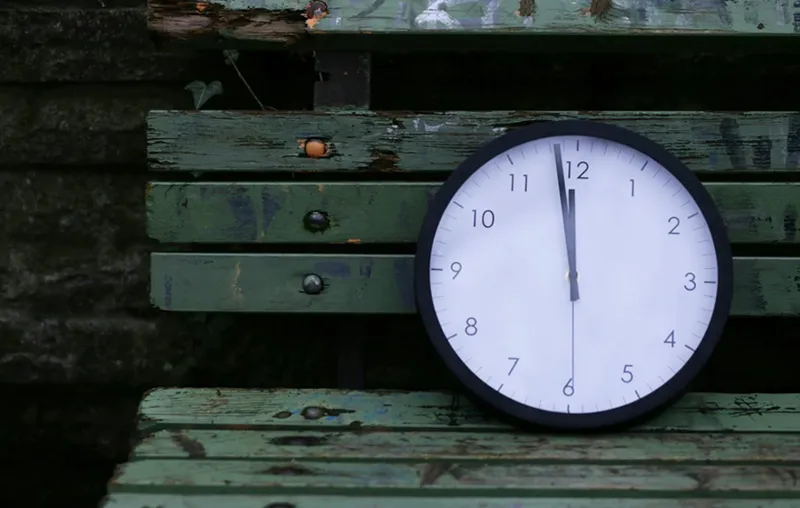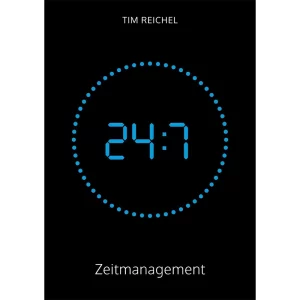Do you want to use your time more efficiently and avoid wasting it? Then you've come to the right place! Whether at work or at home, we all know the feeling that our days are racing by, our concentration is suffering and our to-do list is getting longer and longer.
In my opinion, it is not surprising that we often seem to lack time, as our everyday lives today are characterized by constant availability and increasing demands.
However, with simple time management hacks, you can quickly get your life back on track and use the time available to you more efficiently.
In this article, I will therefore show you the most effective tips, methods and tools that you can use to improve your time management. You'll also find out exactly how you can benefit from them. Let's go!
Advantages: What are the benefits of optimizing your own time management?
Personally, for example, I consciously practise time management, because I value my time and want to achieve as much as possible within your time frame and fill it not only with work, but also with the finer things in life. But there really are so many incredibly good reasons to use your time more efficiently.
Here are some Further advantagesthat should also drive you:
- Prevent stress and excessive demands - thanks to clear priorities and processes.
- Finding time for the essentials - for example with family, friends and hobbies.
- Gain more free time and balance and the Improve work-life balance.
- Increase productivity and master more challenges in less time.
- Achieve goals and use the time to Making dreams come true.
- Become more determinedmake decisions and prevent procrastination.
- Strengthen self-confidence and remain successful in the long term.
10 tips: How can you make better use of your time?
So the bottom line is the overriding goal of time management, Gaining time. What you then do with it is up to you. Motivated enough? Then let's get started! After all, there's no time to lose 😉
1. set priorities
A key aspect of time management is setting priorities. We often lose ourselves in small and rather unimportant tasksthat keep us from the important things.
So decide at the beginning of the day which tasks deserve your full attention today and which can wait. I personally have a list for this in which my Tasks sorted by urgency and importance are - according to the Eisenhower principle.
By prioritizing, you end up investing just a few minutes of your time, to gain many hours. And at the same time you also lower your stress level. 🙂
2. recognize and eliminate time wasters
In our private and professional lives, there are numerous time thieves lurking around every corner, stealing a lot of time unnoticed. Push notifications on the smartphone, the newsfeed on social platformsspontaneous conversations with friends or colleagues or simply endless meetings without a clear agenda.
For effective time management, you need to catch them in the act, so to speak, and make sure they don't distract you again. For example notifications during your productive phase and set clear times when you reply to emails and messages.
Tip: Do you often find yourself reaching for your cell phone when nothing is really wrong? Then be sure to take a look at my article on the Combating smartphone addiction over. You will gain a lot of time, I promise!
3. plan the day ahead with a to-do list
You can really save time with a classic to-do list that gives your day structure. Whether at work or at home: Just take a few minutesto write down the rough tasks for the next day in the evening.
This will give you a much more focused start to the day and Avoid time-consuming delays and ambiguities. Don't overload your to-do list, however, but plan in a sufficient buffer for unforeseen events. Then you can tick off your tasks step by step.
Completely automatic you also strengthen your self-confidencebecause you One challenge after another master.
4. set time blocks
Energy and time are often wasted when we jump from one task to another. By organizing your daily Assign tasks and activities to clear time slots insteadWhen you dedicate yourself to them, you work in a much more focused way.
Here a Examplewhat this could look like in everyday life:
- 8-9 a.m: Answer e-mails
- 9-12 o'clock: Focused work
- 12-13 o'clock: Recovery break
- 1 - 3 pm: Focused work
- 3 - 4 p.m: Making phone calls
- 4-5 p.m: Prepare to-do's for the next day
Due to the time management and the Clear delineation of areas of responsibility you can ultimately concentrate better on one thing and thus save a lot of time. But also plan Breaks in! (more on this in a moment)
Tip: It's best to work in the periods when your performance is at its highest!
5. use aids and tools
As I write this article a timer in the backgroundwho motivates me and makes sure that I don't get distracted during this time. Also Project management tools, Email marketing automation services and Website blocker (e.g. for Facebook, YouTube and Instagram) help me to make better use of my time.
Every now and then I also use a Time recording templateto record my daily tasks and projects. This also allows me to determine where exactly Unused potential for improvement lies dormant. Especially in the initial phase of your conscious time management, such templates can be helpful in creating a clear structure and developing routines that will permanently increase your efficiency.
6. focus on one thing at a time and avoid multitasking
Multitasking is often portrayed as a productive skill, but In reality, it is more of an obstacle to efficient work and even unhealthy.
If you try to complete several tasks at the same time, you put yourself under unnecessary stress, increase the risk of burnout, are more likely to make mistakes and usually takes even longer in the endto get everything done.
So you'd better try, one task after the other stress-free and productive.
Tip: A whole cornucopia of Tips for concentrated work can be found in the linked article.
7. consciously plan breaks
Most people try to improve their time management by work through and do without breaks. However, this is very short-term thinking, as it often happens in Exhaustion and declining productivity, which in turn takes time off the clock.
In everything you do, take a breather every now and then to recover, clear your head and to devote yourself to your tasks with renewed vigor. A Walk during your lunch break or a cup of tea on the terrace work wonders!
8. remain flexible
A widespread misconception is that you can manage your own time by Strict rules and rigid plans can make better use of it. In reality, however, good time management only works if it remains flexible.
So let yourself Room for unforeseen events and be prepared to adjust your plan if necessary. Sometimes things come up - and that's okay.
Simply adapt your schedule to the situation at hand, without losing the common thread. So you stay Relaxed even in hectic times and confident.
9. set goals
Of course, good time management is not just limited to the current day, but also requires long-term planning and objectives to which your actions are clearly aligned. The goals should Specific, measurable, attractive, realistic and scheduled (SMART goals) so that you can achieve them at some point and save time along the way.
It is also helpful to stop striving for perfectionism, as at a certain point it costs you an unnecessary amount of time. Simply follow the 80/20 rule (Pareto principle), which says that you can achieve 80 percent of the results in 20 percent of the time.
The remaining 20 percent are, so to speak "perfectionist trivia"which is time-consuming and has no major effect on outcome.
10. internalize the art of saying no
We are often tempted to say YES, even though we are thinking NO. Be it out of politeness, sense of duty or the Desire to do justice to everyone. That takes time, of course!
One of the biggest challenges in time management is therefore learning to say NO to others and to respect your own time. Communicate boundaries clearly. How to take over Responsibility for your time and decide for yourself how you want to use them.
Time management as the key to a better quality of life
Time management is not a science, but rather a Question of organization and discipline. With the tips and tricks from this article, you can now give your day structure and gain a lot of time - without being overwhelmed. On the contrary: you will become more relaxed, more self-confident and have more free time.
"It is not that we have a short time to live, but that we waste a lot of it."
Lucius Annaeus Seneca, Roman philosopher and naturalist († 65 AD)
Do you have any questions, suggestions or other useful tips for good time management? What do you do to make the best use of your time? I look forward to hearing from you in the comments.
Stay efficient,

PS: Do you spend a lot of time looking at screens? To protect your eyes, you should turn off your Consciously reduce screen time. I'll show you how this works in the linked article.









